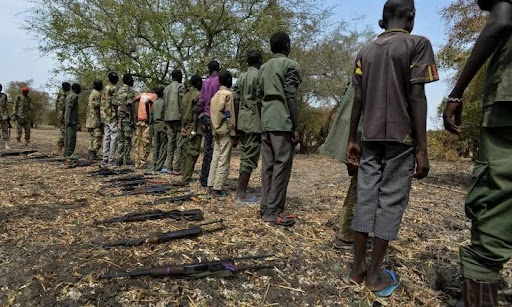Over 8,000 Children Recruited As Soldiers By Armed Groups In Nigeria – UNICEF
UNICEF calls for an end to the recruitment and use of children by armed groups in Nigeria, and the release of those in the custody of such groups.

In the past 13 years, more than 8,000 girls and boys have been recruited and used as child soldiers in different roles by armed groups in Northeast Nigeria, UNICEF said in a statement.
“We call for an immediate end to the recruitment and use of innocent children as soldiers or for any other conflict-related role,’’ said Phuong T. Nguyen, UNICEF Chief of Maiduguri Field Office.
“It is unacceptable and unconscionable that girls and boys continue to serve on the frontlines of a conflict they did not start,” Nguyen said in the statement released to mark the International Day Against the Use of Child Soldiers, otherwise known as ‘Red Hand Day.’
According to a 2017 United Nations report on children and armed conflict, there were 2,122 cases of deployment of children for military purposes in Nigeria in 2016.
The report also stated that Boko Haram used four boys and 26 girls for suicide attacks in 2016: 13 more children were killed in November and December of the same year by the Nigerian security forces, which suspected them of carrying bombs.
The Civilian Joint Task Force (CJTF), a vigilante group that supports the Nigerian troops in the fight against insurgents recruited child soldiers in Nigeria, though they were mostly used for supporting roles, according to another report.
But in the statement, UNICEF said the armed conflict in Northeast Nigeria has claimed thousands of lives and disrupted livelihoods and access to essential services for children and their families.
Nearly one million homes and 5,000 classrooms have been razed in the protracted armed conflict, it said.

Calls to sign Handover Protocol for children
While reiterating its call to the authorities in Nigeria to end the phenomenon of child soldiers, UNICEF also called on the government to sign the Handover Protocol for children encountered in the course of armed conflict in Nigeria and the Lake Chad Basin Region, which would end the detention of children formerly associated with armed groups.
According to the UN agency, the Handover Protocol would ensure children encountered during military and security operations are transferred from military custody to civilian child protection actors to support their reintegration into society through the provision of family tracing and reunification services and medical, educational and psychosocial recovery services.
It added that support would also include life skills support, skills training, and links to decent work.
UNICEF cited the Borno State Child Protection Act, recently signed into law by Governor Babagana Zulum which prohibits and prescribes stiff penalties for the violation of children’s rights.
The Optional Protocol to the Convention on the Rights of the Child on the Involvement of Children in Armed Conflict also prohibits the forced recruitment or conscription of children under 18 by government forces, and the participation of children under 18 in active hostilities by any party.
Ratified by the Nigerian Government in 2012, the Optional Protocol places obligations on non-state armed groups, not to, under any circumstances, recruit or use in hostilities persons under the age of eighteen.
“We must do more to ensure that Nigeria’s children do not suffer the worst impacts of conflict,” said Nguyen.
“We owe girls and boys a chance to leave the horrors of conflict behind. Every day of delay in the custody of armed groups is a tragedy with grave implications for the children, families, and Nigerian society as a whole.”
In June 2017, the U.S. government in a report accused the Nigerian government of using child soldiers. The report alleged that some of the child soldiers in Nigeria were arrested or detained for alleged connections with Boko Haram and might have been forced into military operations by the state.
Between Jan. and Aug. 2017, 83 children were made into “human bombs,” doubling the number of child suicide attacks in the entire year of 2016. “Most of the children used were girls.”
The United Nations in 2017 called for the unconditional release of children from armed forces worldwide and the increase of resources for reintegration and education of released children.
UNICEF estimated in 2017 that 65,000 children worldwide had been released from armed groups in the past decade.
Apart from Nigeria, the United Nations identified 14 countries where children were widely used by such groups: Afghanistan, Colombia, Central African Republic, the Democratic Republic of the Congo, Iraq, Mali, Myanmar, Nigeria, Philippines, Somalia, South Sudan, Sudan, Syria, and Yemen. Also, Turkey was added to the list in 2019.
Support Our Journalism
There are millions of ordinary people affected by conflict in Africa whose stories are missing in the mainstream media. HumAngle is determined to tell those challenging and under-reported stories, hoping that the people impacted by these conflicts will find the safety and security they deserve.
To ensure that we continue to provide public service coverage, we have a small favour to ask you. We want you to be part of our journalistic endeavour by contributing a token to us.
Your donation will further promote a robust, free, and independent media.
Donate HereStay Closer To The Stories That Matter




